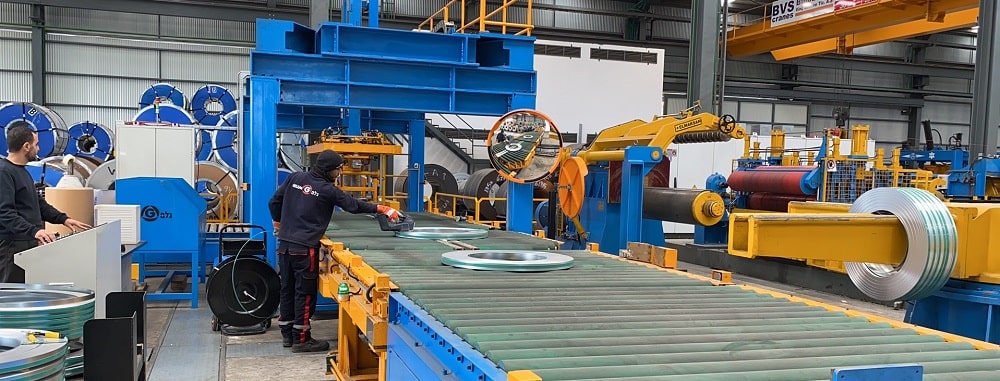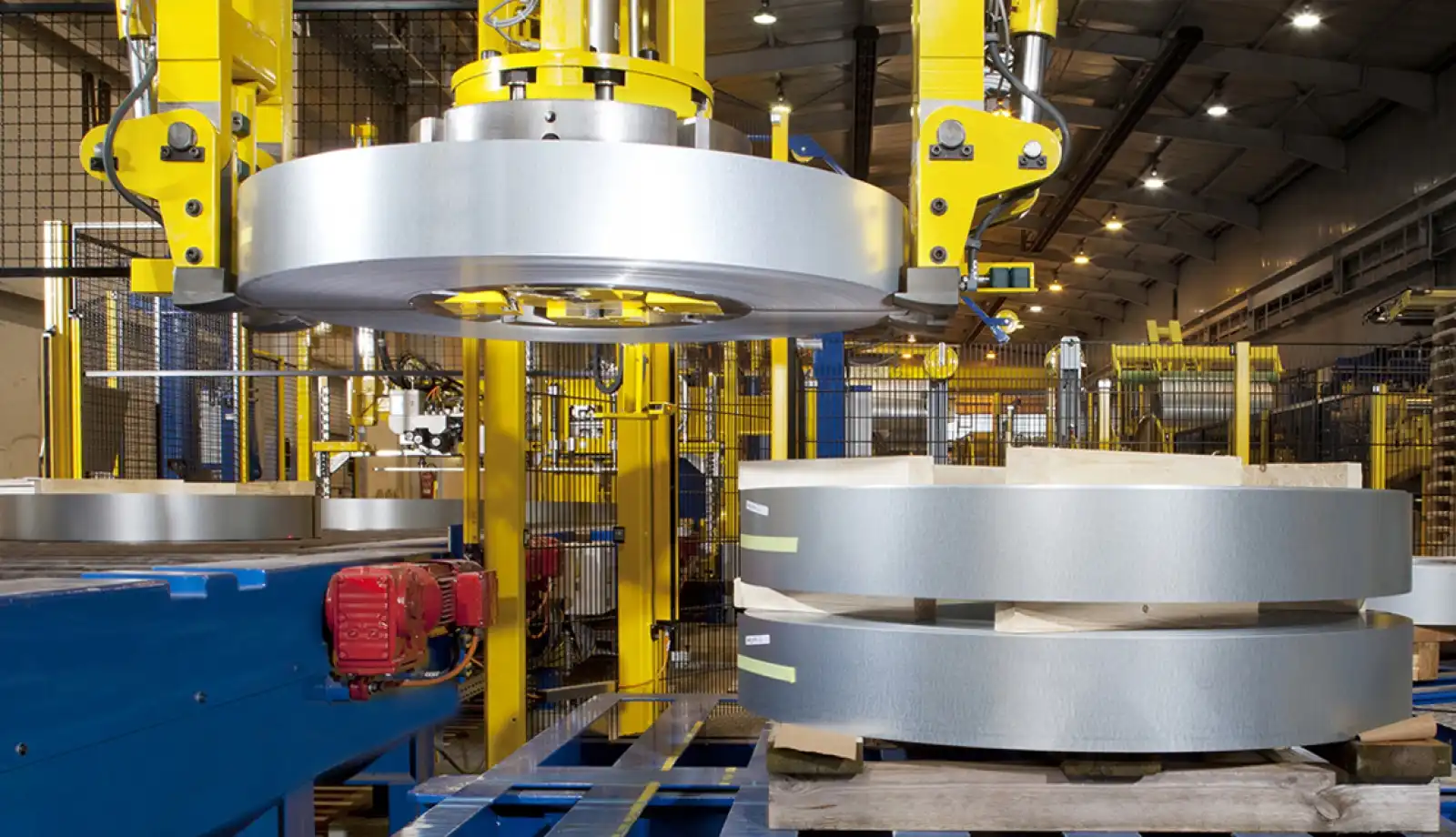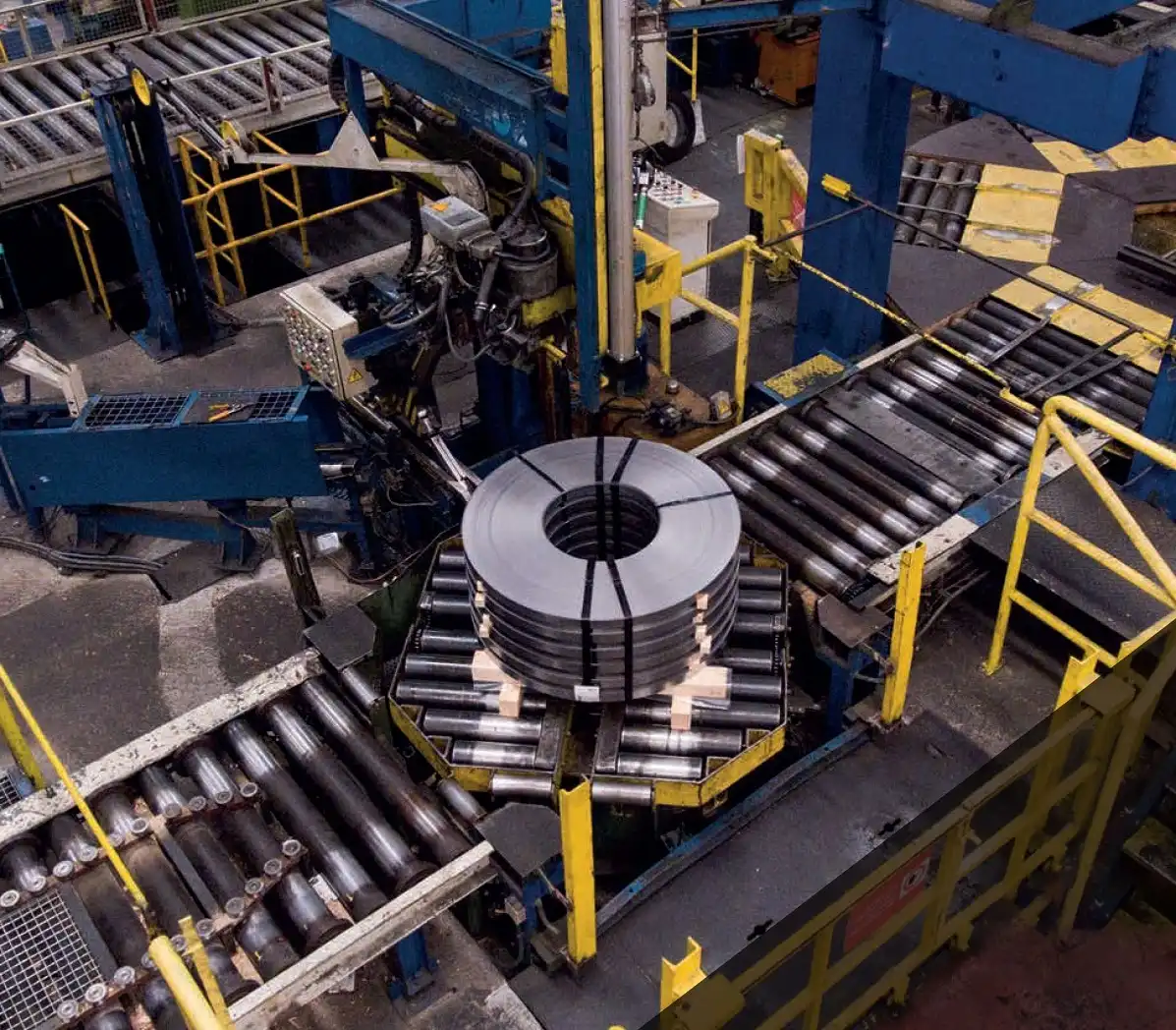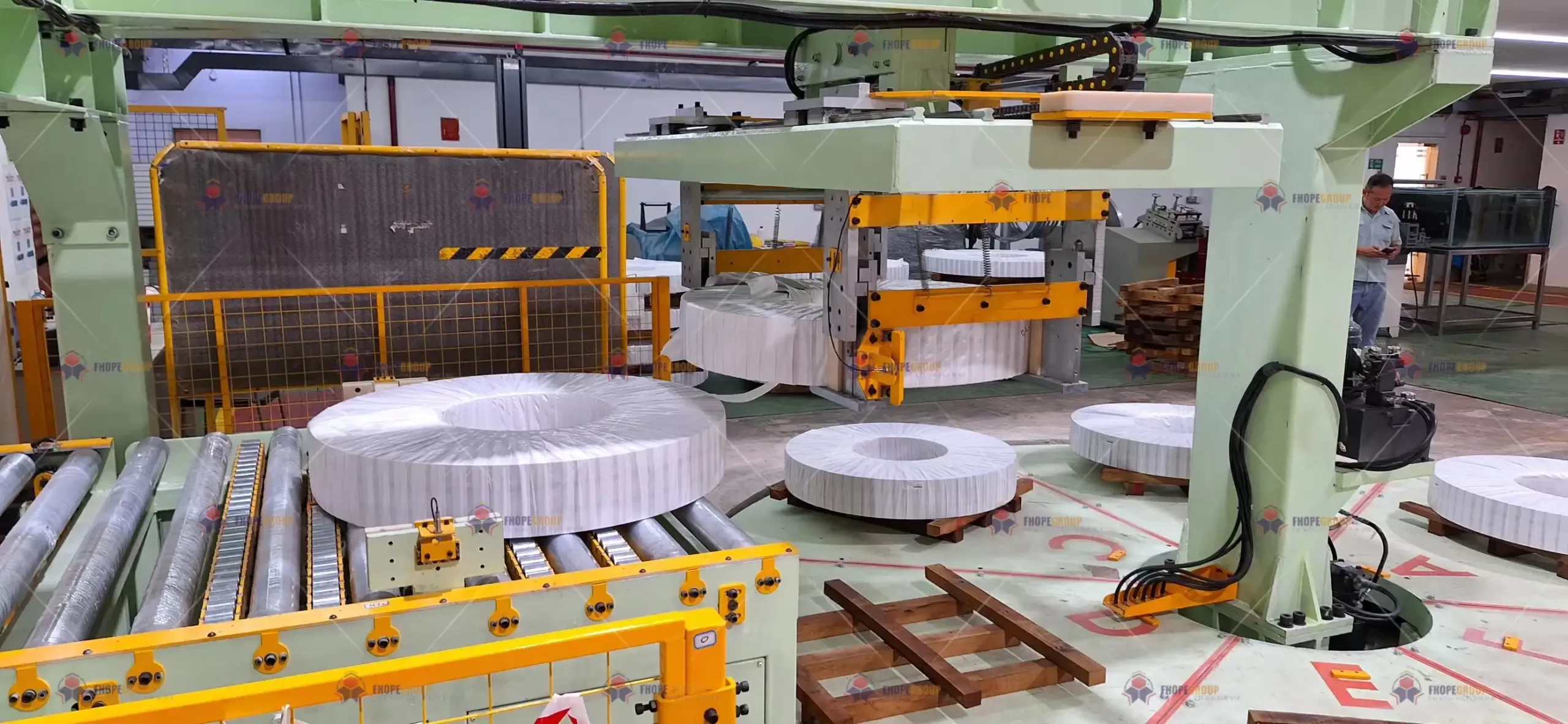You have invested heavily in your steel production facility in Saudi Arabia. Your operations depend on every piece of equipment running at peak efficiency. But a shadow hangs over every production manager's head: downtime. What happens when your steel coil packing line, the final and critical step before shipping, suddenly stops? The entire production chain grinds to a halt. Every hour of inaction means lost revenue, delayed shipments, and a potential blow to your hard-won reputation. You're left waiting, scrambling for an overseas technician or a small part stuck in customs, watching your profits evaporate. This is a scenario no steel mill can afford. The solution isn't just a better machine; it's a smarter support strategy. It's about having a dedicated partner on the ground, with local service engineers and a ready supply of spare parts right here in Saudi Arabia. This transforms a potential crisis into a minor hiccup.
For a steel coil packing line in Saudi Arabia, having access to local service and rapid spare parts support is the most critical factor in maximizing uptime and protecting your investment. A reliable partner like SHJLPACK ensures that trained engineers and essential components are available within the Kingdom, reducing crippling downtime from weeks or days to mere hours. This local presence is fundamental to maintaining a smooth, profitable, and reliable operation in the demanding steel industry.

This might sound simple, but the difference between a supplier with a local office and one without is monumental. It's the difference between a quick fix and a catastrophic failure. As an engineer who has built a factory from the ground up, I’ve seen firsthand how downtime can cripple even the most successful operations. The value of a local partner goes far beyond simple repairs. It's about proactive maintenance, strategic advice, and a deep understanding of your specific operational challenges in the region. Let's explore how this local support network directly translates into a more resilient and profitable business for you.
How does local service in Saudi Arabia truly impact your ROI?
Calculating the return on investment for a new piece of machinery is a standard part of your job. You look at the purchase price, the installation costs, and the expected gains in productivity and efficiency. But have you ever calculated the cost of not having immediate, local support? A single major downtime event, lasting days instead of hours, can completely erase the efficiency gains you projected for an entire year. The costs spiral quickly, from lost production to potential penalties for late delivery. Viewing local service as a simple operational expense is a mistake. It is, in fact, one of the most powerful drivers for protecting and enhancing your ROI.
Local service in Saudi Arabia directly impacts your ROI by dramatically minimizing unplanned downtime, which is often the largest and most unpredictable variable cost in a steel mill's packing operation. By providing immediate on-site troubleshooting, expert repairs, and preventive maintenance, a local support team ensures your steel coil packing line consistently achieves its projected output and profitability without the risk of expensive, extended interruptions.

Deconstructing the Costs of Downtime
When a machine stops, the most obvious cost is the lost production. But that's just the beginning. The true financial damage is much deeper. As someone who has managed a factory floor and a company balance sheet, I've learned to look at these costs in two distinct categories: direct and indirect.
Direct Costs: These are the immediate, tangible expenses you see on a report.
- Lost Production Value: If your line produces 100 tons per hour and your profit is $50 per ton, every hour of downtime costs you $5,000 in lost profit, at a minimum.
- Idle Labor: Your operators and staff are still on the clock, but they are not producing anything. This is a direct drain on your payroll with zero output.
- Shipping & Logistics: An overseas engineer needs a flight, visa, hotel, and transportation. These costs add up quickly before any work has even begun.
- Contract Penalties: If the downtime causes you to miss a delivery deadline with a key customer, you may face significant financial penalties outlined in your contract.
Indirect Costs: These are the hidden, long-term damages that are harder to quantify but can be far more destructive.
- Reputational Damage: Consistently delivering late damages your reputation as a reliable supplier. In a competitive market, customers will quickly move to a competitor they can count on.
- Supply Chain Disruption: Your downtime affects your customers' production schedules, causing a ripple effect that can permanently damage business relationships.
- Team Morale: Constant emergencies, stressful situations, and the pressure of a stalled production line can lead to burnout and high employee turnover.
- Wasted Management Time: Your senior managers and engineers are pulled away from strategic initiatives to focus on crisis management.
Here is a simple comparison that illustrates the financial power of local service.
| Metric | With Overseas Support | With Local Saudi Support | Impact |
|---|---|---|---|
| Technician Arrival Time | 24 - 72 hours | 2 - 6 hours | Reduced by 90% |
| Average Downtime | 48 hours | 4 hours | Minimized Disruption |
| Cost of Downtime (@ $5k/hr) | $240,000 | $20,000 | $220,000 Saved |
| Travel & Logistics Cost | ~$5,000 | ~$200 | Reduced by 96% |
| Total Incident Cost | ~$245,000 | ~$20,200 | Over 90% Cost Reduction |
The numbers speak for themselves. The investment in a supplier with a robust local service infrastructure isn't just an insurance policy; it's a direct contribution to your bottom line.
What is the real cost of slow spare parts for a steel coil packing line?
A critical proximity sensor on your packing line fails. The cost of the sensor itself is only $150. It seems like a minor issue. But that sensor is not in your inventory, and your machine supplier has to ship it from their factory in Europe or Asia. The part gets stuck in customs for a week. For that entire week, your multi-million dollar steel coil packing line is completely idle. The true cost of that $150 sensor has now ballooned into hundreds of thousands of dollars in lost production, idle labor, and potential contract penalties. This scenario is all too common. The price tag of a spare part is almost irrelevant. Its real cost is measured by the length of the downtime it creates.
The real cost of slow spare parts for a steel coil packing line is the value of your lost production multiplied by the duration of the downtime. A component worth a few hundred dollars can easily cause financial losses exceeding six figures if it is not stocked locally in Saudi Arabia. This is why a supplier’s commitment to maintaining a comprehensive, regional spare parts warehouse is absolutely essential for your operational and financial stability.

Shifting Focus from Price to Availability
In my early days as an engineer, I focused on the technical specifications of a machine. But after I started my own factory, I learned a painful lesson: the best machine in the world is useless if you can't get parts for it. As a business owner, you must shift your evaluation of suppliers from the machine's price to the support system behind it. A robust spare parts strategy is a core part of that system.
The "True Cost" Calculation
Let's break down the real cost of a part that is not available locally.
True Cost = Part Price + Shipping Cost + Customs Fees + (Downtime Hours x Cost of Lost Production Per Hour)
Using this simple formula, you can see how a small part creates a massive financial liability.
- Part Price: $150
- International Express Shipping: $250
- Customs & Duties: $50
- Downtime: 5 days = 120 hours
- Cost of Lost Production: $5,000/hour
- Downtime Cost: 120 hours x $5,000 = $600,000
The True Cost of that $150 sensor is $600,450. This is the reality of relying on an international supply chain for critical operational components.
A Proactive Inventory Strategy
A strategic partner doesn't just wait for you to order parts. They anticipate your needs. At SHJLPACK, we analyze data from our entire fleet of installed machines to identify components with the highest failure rates or the longest manufacturing lead times. We then use this data to build a dedicated spare parts inventory, stored locally in key regions like Saudi Arabia.
| Part Category | Examples | Risk of International Shipping | Benefit of Local Stock |
|---|---|---|---|
| Wear Parts | Strapping heads, rollers, belts, cutting blades | High. These parts have a predictable lifespan and are needed regularly. | Enables scheduled replacement during planned maintenance, avoiding unplanned stops. |
| Electrical Components | Sensors, PLCs, drives, motors | Very High. A failure is sudden and completely stops the line. Lead times can be long. | A local replacement can have the line running again in hours, not weeks. |
| Custom Fabricated Parts | Special brackets, machine-specific guards | Extreme. These parts are not off-the-shelf and require manufacturing time plus shipping. | Having a critical custom part in local stock is the ultimate protection against long-term downtime. |
Your supplier's spare parts strategy is a direct reflection of their commitment to your success. Don't let a small component cause a massive financial disaster. Ensure your partner has the parts you need, where you need them: in Saudi Arabia.
How do you choose a supplier that guarantees rapid support in the region?
Many equipment suppliers will make broad promises about "global support" or "24/7 service." These statements sound reassuring during a sales presentation. But when your packing line is down at 3 AM in Jubail, you quickly discover that "global support" means an unanswered email to an office in a different time zone. Vague promises are useless in a real-world emergency. To protect your operation, you must move beyond marketing slogans and critically evaluate a supplier's real, tangible ability to provide support within Saudi Arabia. This requires asking direct, specific questions before you ever sign a contract.
To choose a supplier that guarantees rapid support in Saudi Arabia, you must demand concrete proof of their local infrastructure and capabilities. Ask for the physical address of their local service office, not just a P.O. box. Inquire about the number of full-time, locally-based service engineers. Request the location of their spare parts warehouse within the Kingdom and ask for a list of critical parts they keep in stock. Finally, ask for local customer references in Saudi Arabia that you can contact directly. Do not rely on promises; base your decision on verifiable facts.

The Supplier Vetting Checklist
When I was building my own factory, I learned to be very thorough. I developed a checklist to separate the serious partners from the ones who just wanted to make a sale. I encourage you to use a similar approach. Treat this as a crucial part of your due diligence.
Tier 1: The Non-Negotiables
These are the foundational questions. If a supplier can't give you a clear, positive answer to these, you should be very cautious.
- Local Office: "Can you provide the physical address and contact information for your service and sales office located within Saudi Arabia?"
- Local Staff: "How many full-time service engineers and technicians are permanently based in Saudi Arabia? Are they direct employees or third-party contractors?"
- Spare Parts Warehouse: "Where is your spare parts warehouse located in the Kingdom? Can we visit it? Can you provide an inventory list of critical components for our machine that are stocked there?"
- Local References: "Can you provide contact details for at least two other steel companies in Saudi Arabia that are currently using your equipment and service?"
Tier 2: The Service Level Agreement (SLA)
A verbal promise is not enough. Your expectations for support must be written into your contract in a formal Service Level Agreement.
- Guaranteed Response Time: "What is your contractually guaranteed maximum time to have a qualified engineer on-site at our facility after we report a critical failure?" (It should be hours, not days).
- Parts Availability: "What is your guaranteed dispatch time for critical spare parts from your local warehouse?"
- Technical Phone Support: "Do you offer 24/7 technical phone support with engineers who are fluent in English and/or Arabic?"
Tier 3: The Partnership Test
This goes beyond technical capabilities and assesses if the supplier will be a true strategic partner.
- Proactive Maintenance: "What is your program for preventive and predictive maintenance? How do you help us schedule maintenance to minimize production impact?"
- Training: "What does your operator and maintenance training program look like? Is it conducted on-site at our facility by your local engineers?"
- Understanding Our Business: "How will you work with us to understand our specific production goals, challenges, and plans for future growth?"
Choosing the right supplier is one of the most important decisions you will make. Take the time to be thorough. The supplier who can confidently and transparently answer these questions is the one who is truly invested in the Saudi Arabian market and, more importantly, in your success.
My Insights: Why a True Partnership in Saudi Arabia is Your Best Investment?
Buying a machine is a transaction. It solves an immediate need, like increasing your packing capacity. But your real challenges are not a one-time event. You face constant pressure from fluctuating energy costs, evolving environmental regulations, and volatile market demand. A machine, by itself, cannot solve these ongoing problems. A transactional supplier, who is only focused on the initial sale, will be gone when you need help navigating these complex issues. This is why a true partnership is so vital. A partner who is deeply invested in the Saudi market and understands your long-term vision becomes a valuable extension of your own team, helping you build a more resilient and profitable business for years to come.
A true partnership in Saudi Arabia is your best investment because it transforms a piece of capital equipment into a long-term strategic asset. A partner like SHJLPACK provides much more than a steel coil packing line. We deliver ongoing expertise in process optimization, cost reduction strategies, and practical advice on future-proofing your operations. This continuous collaboration delivers value that far exceeds the initial price of the machine.

From Engineer to Owner: A Shared Perspective
My journey in this industry began on the factory floor as a packing machine engineer. I felt the immense pressure and frustration when a line went down. I was the one who had to work through the night to get production running again. I understand the technical challenges intimately. Later, when I established my own packing machine factory, my perspective expanded. I had to manage the finances, deal with customer complaints about delays, and worry about the company's profitability and reputation. I had to think like a business owner.
This journey, from engineer to owner, allows me to connect with leaders like you on a deeper level. I have walked in your shoes. I understand that your concerns go beyond technical specifications. You are focused on ROI, operational stability, and long-term strategic growth. This shared perspective is the foundation of SHJLPACK. We are not just a company of salespeople; we are a company of engineers and problem-solvers who understand the business of steel.
What "Total Solution for Wrapping Machine" Really Means
Our slogan is not just a marketing phrase; it is our operational philosophy. It defines the scope of our partnership with you.
- Before the Sale: We work as consultants, analyzing your production flow, bottlenecks, and future goals to design a packing solution that is truly tailored to your needs.
- During the Sale: We provide transparent, detailed proposals so you know exactly what you are investing in.
- After the Sale: This is where the true partnership begins. Our commitment includes:
- Expert Installation & Commissioning: Performed by our own engineers to ensure a smooth startup.
- Comprehensive Training: We empower your local team to operate and maintain the equipment confidently.
- Local Service & Support: Our team in Saudi Arabia is your team, ready to provide rapid assistance.
- Proactive Maintenance & Spare Parts: We help you prevent problems before they start.
- Future Growth: We stay engaged, offering advice on upgrades, automation, and adapting to new market demands.
This holistic approach is what we mean by a "Total Solution."
I built my business and achieved my own success by building strong, trust-based relationships with my clients. I saw them succeed, and in turn, SHJLPACK succeeded. My goal now is to replicate that model of shared success in vital industrial hubs like Saudi Arabia. We are here to be your partner, sharing the knowledge and expertise that will help your business thrive.
Conclusion
Ultimately, choosing a steel coil packing line with strong local service and parts in Saudi Arabia is not an expense. It is a strategic investment to protect your uptime, your reputation, and your profits.





